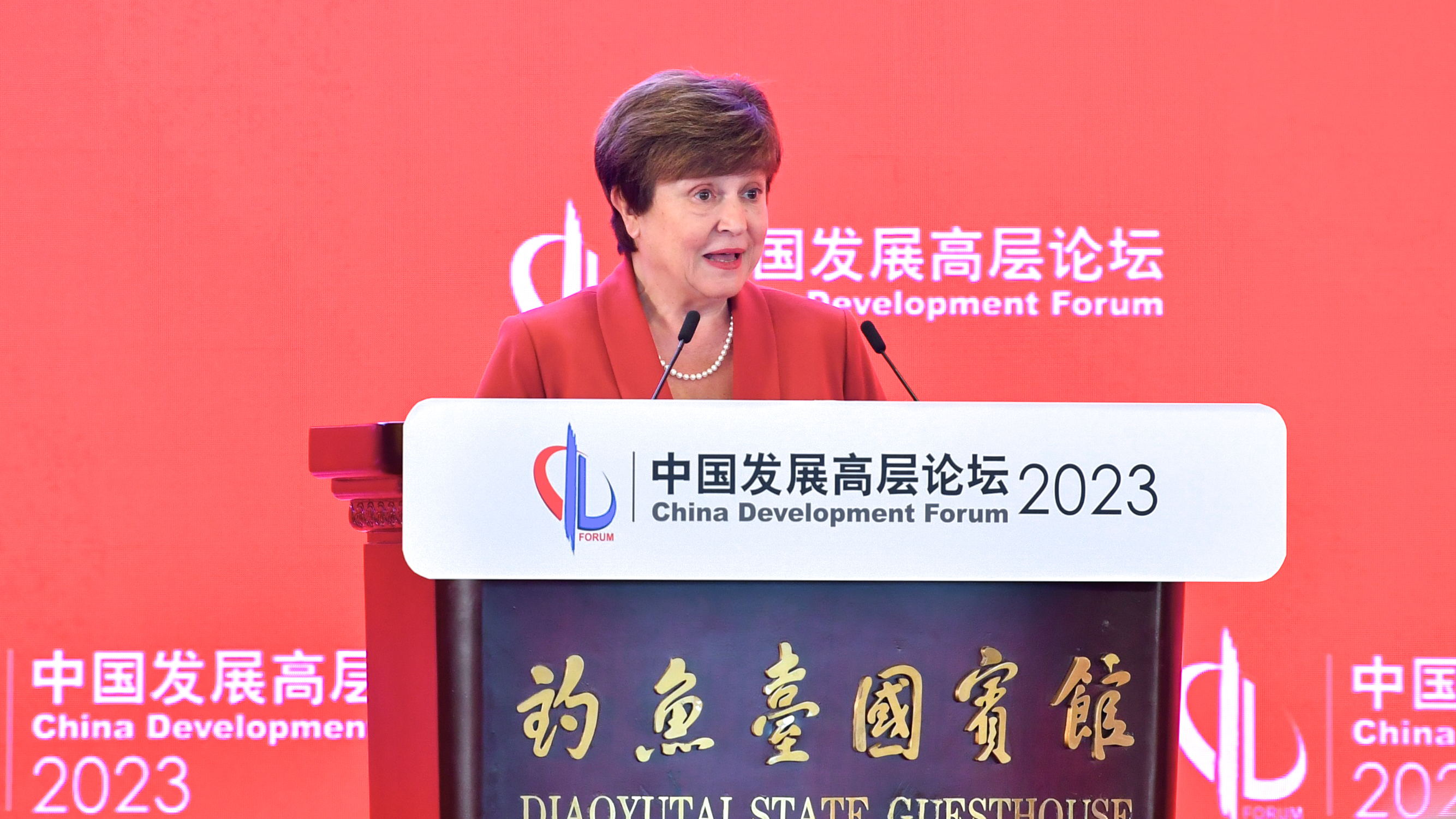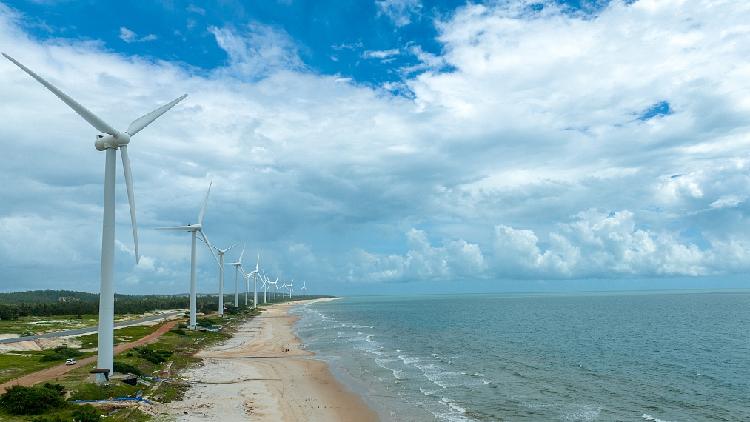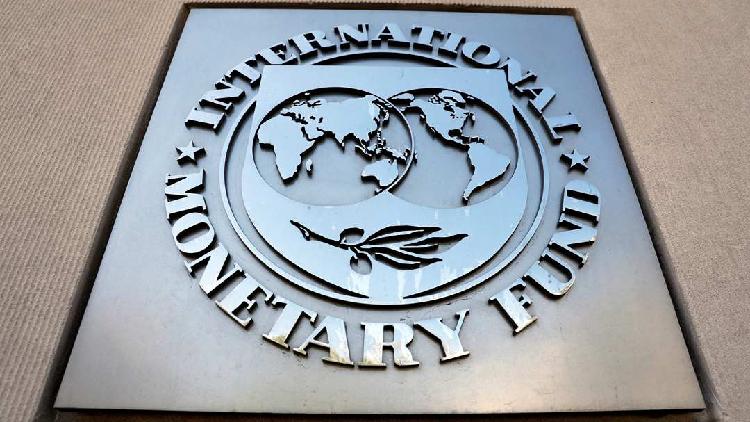Economy 15:02, 26-Mar-2023

"China, which is seeing a strong rebound in economy, is set to account for around a third of global growth in 2023, the head of the International Monetary Fund (IMF) said in a speech delivered to the China Development Forum 2023 on Sunday.
Kristalina Georgieva, speaking on the second day of the annual forum held in Beijing, referred to the solid economic recovery in China as "green shoots" in the world economy, which is currently afflicted by scarring from the pandemic, geo-economic fragmentation and financial stability risks.
Georgieva pointed out that China's recovery gives a welcome lift to the world economy, saying that according to IMF analysis, a 1-percentage-point increase in China's GDP growth leads to a 0.3-percentage-point increase in growth in other Asian economies on average.
> In January, the IMF upgraded its growth projection for China in 2023 to 5.2 percent, up from its October forecast of 4.4 percent. . .
"With such a solid recovery, China can now build on positive momentum, and through comprehensive policies, stay on the growth path towards convergence with advanced economies," she said.
Read more: China holds development forum offline, highlights economic recovery
Additional Notes: The IMF now expects US GDP growth of 1.4% this year, up from a 1.0% prediction in October and following 2.0% growth in 2022. This is down to stronger-than-expected consumption and investment in the third quarter of 2022, a robust labour market and strong consumer balance sheets.
The Eurozone outlook is also up – to 0.7%, versus 0.5% in October, although this is down from 3.5% growth in 2022. The IMF says Europe has adapted to higher energy costs more quickly than expected.
The IMF has revised China's growth outlook sharply higher, to 5.2% from a 4.4% forecast in October. Zero-COVID policies in 2022 slashed China's growth rate to 3.0%, putting it below the global average for the first time in more than 40 years.
India's outlook remains robust, with unchanged forecasts for a dip in 2023 growth to 6.1% but a rebound to 6.8% in 2024, matching its 2022 performance.
Britain is the only major economy the IMF expects to shrink this year. It forecasts a 0.6% fall in GDP as households struggle with rising living costs, including for energy and mortgages.
Remarks by Managing Director Kristalina Georgieva at the 2023 China Development Forum
March 26, 2023
As prepared for delivery
Distinguished guests, ladies, and gentlemen—good morning, zao shang hao!
I am honored to join you as we gather in person at the beginning of a new Spring. This season will see cities such as Beijing transformed by the dazzling colors of millions of flowers. Their beauty and vibrancy heralds fresh hope and opportunity.
For the world economy, however, spring is yet to come.
We expect 2023 to be another challenging year, with global growth slowing to below 3 percent as scarring from the pandemic, the war in Ukraine, and monetary tightening weigh on economic activity. Even with a better outlook for 2024, global growth will remain well below its historic average of 3.8 percent.
Uncertainties are exceptionally high, including because of risks of geo-economic fragmentation which could mean a world split into rival economic blocs—a ‘dangerous division’ that would leave everyone poorer and less secure. Together, these factors mean that the outlook for the global economy over the medium-term is likely to remain weak.
It is also clear that risks to financial stability have increased. At a time of higher debt levels, the rapid transition from a prolonged period of low interest rates to much higher rates—necessary to fight inflation—inevitably generates stresses and vulnerabilities, as evidenced by recent developments in the banking sector in some advanced economies.
Policymakers have acted decisively in response to financial stability risks, and advanced economy central banks have enhanced the provision of U.S. dollar liquidity. These actions have eased market stress to some extent, but uncertainty is high which underscores the need for vigilance.
So—we continue to monitor developments closely and are assessing potential implications for the global economic outlook and global financial stability. We are paying close attention to the most vulnerable countries, in particular low-income countries with high levels of debt.
And we will provide a detailed assessment in our forthcoming World Economic Outlook and Global Financial Stability Report, which will be published in the coming weeks.
Fortunately, the news on the world economy is not all bad.
We can see some ‘green shoots’, including in China.
Here the economy is seeing a strong rebound, and the IMF’s January forecast puts GDP growth at 5.2 percent this year—a sizeable increase of more than 2 percentage points from the 2022 rate. Driving this growth is the anticipated rebound of private consumption as the economy has reopened and activity has normalized.
This matters for China, and it matters for the world. The robust rebound means China is set to account for around one third of global growth in 2023—giving a welcome lift to the world economy. And beyond the direct contribution to global growth, our analysis shows that a 1 percentage point increase in GDP growth in China leads to 0.3 percentage point increase in growth in other Asian economies, on average—a welcome boost.
With such a solid recovery, China can now build on positive momentum and—through comprehensive policies—stay on the growth path towards convergence with advanced economies.
As the Chinese saying goes: “The whole year's work depends on a good start in spring.
So, what can policymakers do? Let me highlight two opportunities:
The first opportunity is to raise productivity and rebalance the economy away from investment and towards more consumption-driven growth that is more durable, less reliant on debt, and will also help address climate challenges.
> To get there, the social protection system will need to play a central role through higher health and unemployment insurance benefits to cushion households against shocks.
At the same time, market-oriented reforms to level the playing field between the private sector and state-owned enterprises, together with investments in education, would significantly lift the economy’s productive capacity.
The combined impact of these policies could be significant.
IMF research shows that productivity-enhancing reforms in China could lift real GDP by as much as 2.5 percent by 2027, and by around 18 percent by 2037—growth that would be both higher quality and more inclusive. What’s more, it would also help offset demographic pressures and narrow the gap to advanced economy income levels even faster.
But the benefits of rebalancing don’t stop there—and this brings me to the second opportunity—green growth.
We welcome China’s goal of net-zero emissions by 2060, a commitment that underlines the importance of tackling climate change for long-term development.
Like many countries, China is vulnerable to extreme weather events that are becoming more frequent and more damaging. Just last year, for example, severe droughts reduced hydropower output and put pressure on the power sector.
What’s more, temperatures in China are rising faster than the global average, bringing increased risks to its economic growth. Unmitigated warming could lead to estimated GDP losses in China of between 0.5 and 2.3 percent as early as 2030.
The good news is that policies to rebalance the economy will simultaneously help achieve China’s climate goals. Why? Because most of the country’s carbon dioxide emissions are generated from power and industrial activities—so moving to consumption-led growth will cool energy demand and ease energy security pressures.
Putting this in numbers, our research shows such rebalancing could lead to a reduction in carbon dioxide emissions of 15 percent over the next three decades. Again, this translates into benefits for the whole world: a fall in global emissions of 4.5 percent over the same period.
Importantly, lower emissions mean a cleaner environment. This is good for people—as it helps to reduce pollution, improve air quality and public health. And it’s also good for biodiversity— which brings me back to where I started, to flowers.
We often use flowers to express friendship, empathy, and solidarity at difficult moments.
This spirit of solidarity is very much needed in these difficult economic times. Our role at the IMF is to bring our members together to address global challenges.
China has played a constructive role in this regard, including through its contributions to our Poverty Reduction and Growth Trust, its vital financing for our new Resilience and Sustainability Trust, and in helping highly-indebted countries.
In the months and years ahead, continuing to support the world’s most vulnerable countries will be vital. We can only solve the world’s biggest challenges—and avoid the pitfalls of fragmentation—through cooperation.
Let us work together to foster more peace and prosperity—a global economy in full bloom.
Thank you, xiè xie!
IMF Communications Department
MEDIA RELATIONS
PRESS OFFICER: TING YAN
PHONE: +1 202 623-7100EMAIL: MEDIA@IMF.ORG
RELATED STORIES






No comments:
Post a Comment